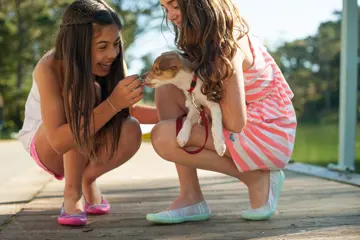Safety
Children should be protected as far as possible from a dog bite (or bite from another pet) as these incidents can have physical and psychological consequences for a child. The foster carer should take every precaution possible, and never leave a child unsupervised with any pet.
There are laws and expectations that govern the responsible ownership of dogs. Some dog breeds are banned including Pit Bull Terriers, Japanese Tosa, Dogo Arentino, Fila Brasileiro and XL Bully dogs.



